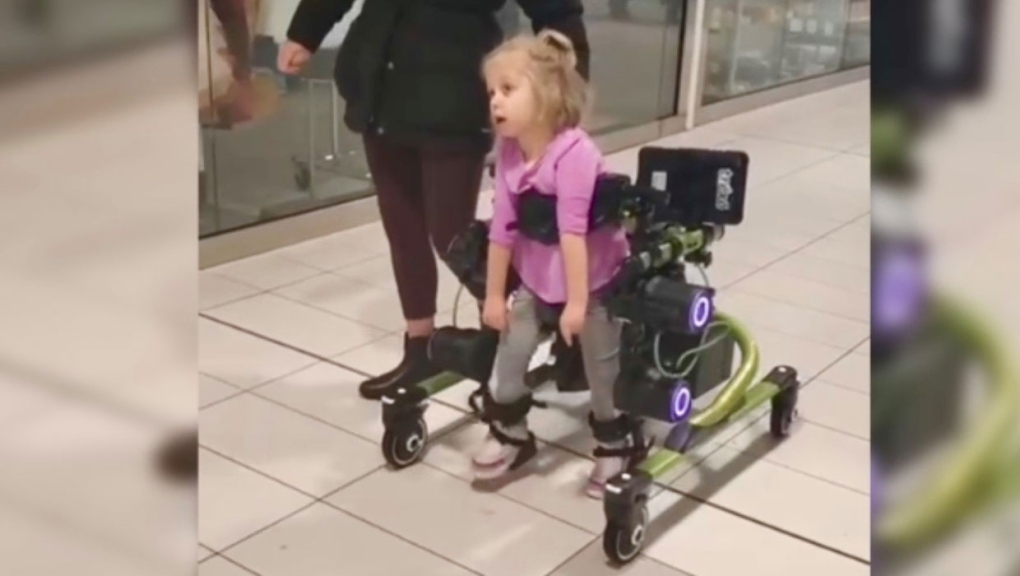'Her face lit up': Alberta woman seeks to give her daughter new legs
The last day in February is a chance for Amanda Levesque to share stories about her seven-year-old daughter Ariana.
She's living with GNB1 syndrome, a disorder that prevents her brain from communicating properly with the rest of her body.
Ariana is one of two children in Canada with the syndrome and there are only about 75 cases diagnosed in the world.
"I always honor this day because of my little kiddo having such a rare disease," said Levesque of Feb. 28. "There's lots of other kiddos that also have rare diseases, there's a whole pile of us I've learned, I've met a huge community of special needs moms and they're amazing, my community is really great."
Ariana was diagnosed with GNB1 five years ago and her mom has taken her all over the country looking for ways to help her brain and body communicate to help improve her motor skills.
The family is just back from a stay at the Alberta Children's Hospital where Ariana was recovering from bilateral hip reconstruction, a common surgery for wheelchair-bound children because of their limited mobility.
"It was causing her some pain and down the road it can really affect your spine so it was something that we needed to do," said Levesque. "It's a typical surgery for for a child, but it's a big one to overcome and hopefully we only have to do it once and then if we're able to rehab her properly, we won't have to do it again."
That rehab requires physiotherapy and a lot of help for Ariana to regain what movement she had in her legs.
"Ariana is at this crucial point where we're rehabbing from surgery, she's seven years old, and it's harder to maneuver her," said Levesque. "It's harder to do the traditional therapy with her regardless of it not really giving her the benefit."
Before her surgery, Ariana took part in a three-month University of Calgary trail study with a set of robotic legs attached to a walker that's called Trexo. It gave Ariana the ability to get out of her wheelchair and walk with the assistance of the device.
"She loved it. Her face lit up when ever she was in Trexo and it didn't take her long that she was wanting to go further and further and further her endurance built up in such a short time," said Levesque. "The results blew me away because we had tried every single therapy over and over and over for years and within a short three months she had made more improvements than she had in the whole five years that we had tried."
Dr. Elizabeth Condliffe, with the university's pediatric onset of neuromotor impairments lab (PONI-lab) and says the Trexo study is 18 months long and has 27 participants. The study received funding from the Alberta Children's Hospital Foundation and The Restore Network.
"Ariana's disorder causes her to have significant difficulty interacting with the environment and navigating through the environment," said Condliffe.
"She's not able to walk and prior to our research, she had difficulty initiating any steps, she has significant trouble holding her head up to look at the environment around her, just to get from her wheelchair to another surface, she has troubles bearing weight on her legs."
Ariana gravitated to the Trexo and wanted to use it everywhere. The family took her on walking adventures indoors where the youngster would go for more than an hour and didn't want to stop. The little girl who could rarely make three steps on her own took 4,000 steps in the three-month trial.
Condliffe says Ariana had some amazing improvements moving from one surface to another, controlling her head movement better and even taking steps on her own without the exoskeleton device.
"We know individuals like Ariana with significant disabilities have many capabilities," she said.
"Technological innovations can help us unlock them and we need to figure out how and so the goal of this research project and many of our research projects are really to figure that out and help people reach their capabilities."
Ariana cried when she had to give up the Trexo at the end of the three-month trial and now her mom is faced with trying to purchase one at a cost of $50,000.
"You have to actually buy the walker that it comes with it so you have to actually purchase some different things along with the robotic legs," said Levesque. "It also comes with a treadmill so that you can utilize it in your home and you don't have to be lugging it outside, it could just be at home and she could be utilizing it."
Levesque has set up a GoFundMe site(opens in a new tab) to help raise funds for a Trexo for her daughter.
Must Watch
Top Videos
CTVNews.ca Top Stories

Border agents seize $2M worth of cocaine at Canada-U.S. border
Authorities at the Coutts, Alta., border crossing seized 189 kilograms of cocaine, with an estimated value of about $2 million, that was being shipped into Canada.
3 hours ago
'Dangerous person alert' issued for Calgary double murder suspect
Calgary police have issued an emergency alert for an armed man they say is a suspect in the double murder of a father and his daughter.
2 hours ago
Matthew Gaudreau's widow welcomes their first child months after his death
Four months after his death, the widow of Matthew Gaudreau announced the birth of their first child. Gaudreau, 29, and his NHL star brother Johnny Gaudreau, 31, were killed after being struck by a driver in August.
2 hours ago
Ontario labour ministry investigating injury on Toronto set of 'Beast Games'
Ontario's labour ministry is investigating an industrial accident on the Toronto set of 'Beast Games,' the newly released Prime Video competition series from YouTube star MrBeast.
1 hour ago
Toronto police warn of extortion scam where suspects send victims 'graphic violent images'
Toronto police say they're receiving an 'increasing' number of reports about a scam where suspects send their victims 'graphic violent images' in an effort to extort money from them.
4 hours ago
The best, worst and weirdest pop culture moments of 2024
You might not remember it all, but CNN took note of every niche pop culture oddity and TikTok fad. And no, perennial history-maker Taylor Swift didn’t even make the cut this year. Helming the highest-grossing tour ever is probably enough recognition.
1 hour ago
'McDonald's wouldn't open': Here are B.C.'s 10 worst 911 nuisance calls of the year
What do overripe avocados, stinky cologne and misplaced phones have in common? Generally speaking, none of them warrant a call to 911.
1 hour ago
Year in review: Notable people who died in 2024
Here is a roll call of some noteworthy figures who died in 2024.
5 hours ago
Halifax airport runway reopens after plane caught fire upon landing
The plane that caught fire upon landing at Halifax's airport over the weekend has been removed, and the runway has reopened.
2 hours ago
























































